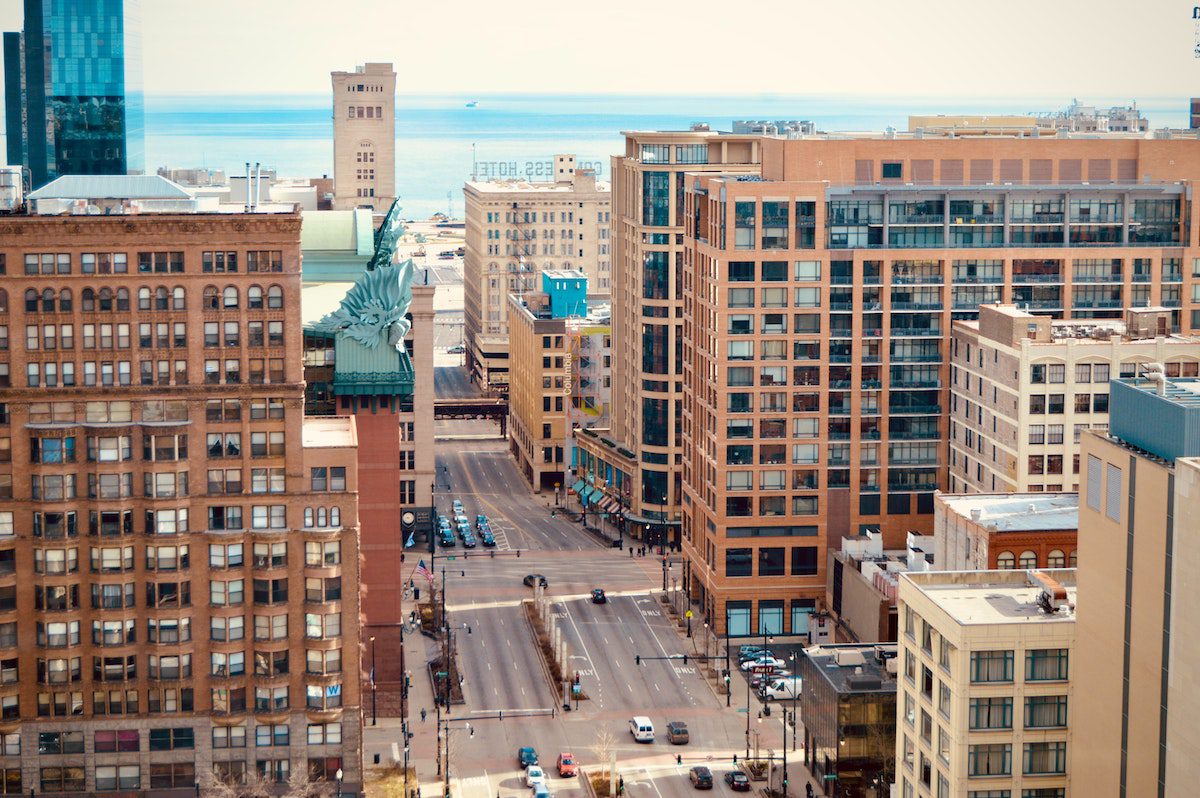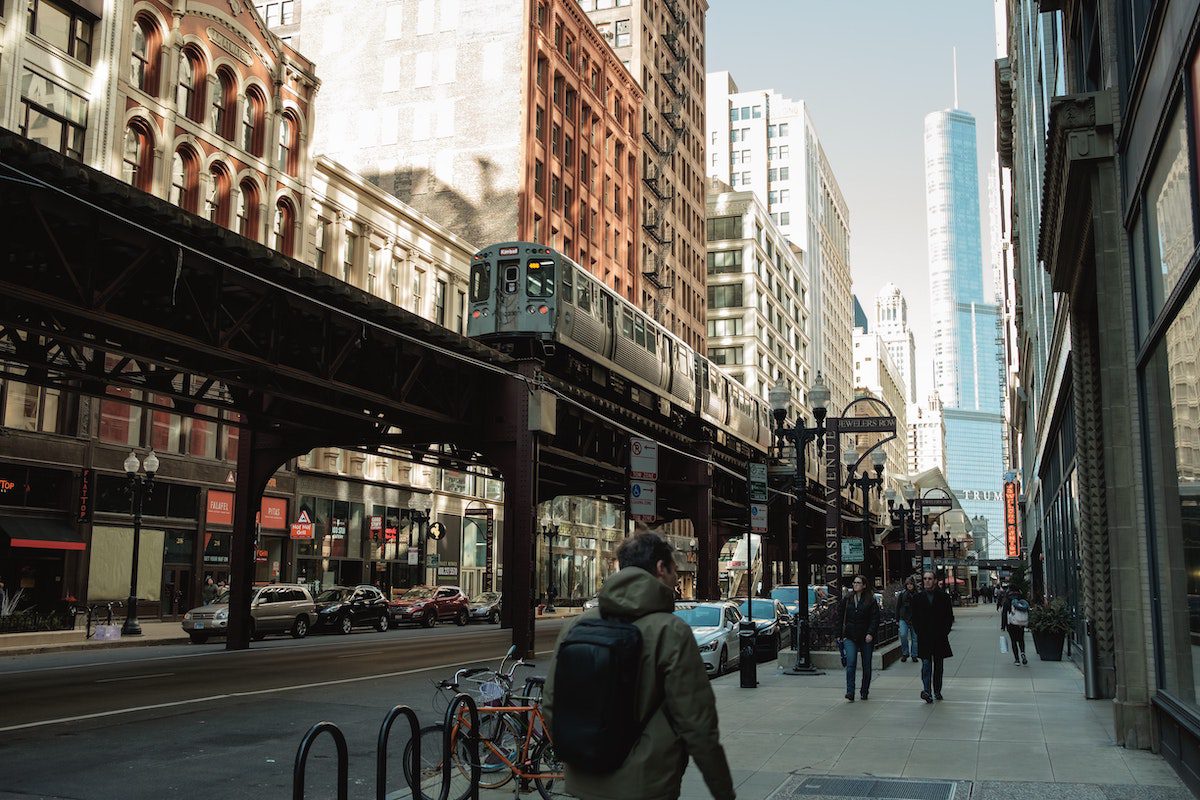Despite its pros, the cost of living in Chicago doesn’t come cheap. At 26.4 percent above the national average, monthly costs here are much like other major cities. It’s slightly less than some, like San Francisco, Boston or New York, and comparable to other cities like Miami or Denver.
However, like San Francisco and Boston, the Windy City has many amenities within walking distance or a quick train ride for easier (and less costly) living options.
Finding your niche in this expensive city is possible by breaking out individual living costs and working out how to stretch your money the furthest. To do this, let’s look at the cost of living in Chicago in its essential parts.
- Housing costs
- Food prices
- Utility costs
- Transportation costs
- Healthcare costs
- Goods and services costs
- Taxes rates
- How much do you need to earn to live in Chicago?

Chicago housing prices
Chicago real estate — whether you’re renting or buying — is becoming slightly more affordable. Housing costs are 52.9 percent above the national average, which is high, but the real estate market here is seeing a decrease. This average is 8.8 below last year.
Your estimated monthly costs, when it comes to housing, will fluctuate dramatically by neighborhood. Right now, rent in Chicago is seeing a small increase. Your average one-bedroom apartment is up 12 percent in rent, with monthly costs of $2,000. Two-bedroom apartments are up in price by nine percent, with an average monthly cost of $2,622.
When it comes to home prices, the median price in Chicago is $370,000, up 4.2 percent over last year. Homes stay on the market for a bit longer than in other major cities, averaging out at around 54 days. This could mean demand is slowing, or there’s too much on the market. With home prices like these, though, it might be a good time to become a homeowner.
Apartment hunting in Chicago
Knowing Chicago’s cost for apartments by neighborhood is truly helpful as you begin your search. While there are plenty of great apartments throughout the city, your cost of living definitely dictates where you can and can’t call home.
You may have to forgo a more expensive area in Chicago, like Fulton Market, where the average one-bedroom is $2,850, or Hyde Park, where you’ll pay an average of $2,715 per month. That’s quite a lot for a single person.
To stay in the business district of Chicago, but pay a little less, River North keeps you in the heart of the city. With an average one-bedroom rent of $1,900, River North gives you all the glitz without upping the average rent too high.
If you’re looking to stay within the city limits and save a little on rent, there are plenty of options. Managing your Chicago cost of living on a budget, average rent for one-beds in Woodlawn and Bridgeport hover right around $1,000 per month.
Chicago food prices
Chicagoans love food. From an iconic Chicago dog at Wrigley Field to that special deep-dish pizza, you have plenty of solely Chicago options. It also doesn’t hurt that the city is home to Michelin-starred chefs and restaurants specializing in almost any type of cuisine.
However, eating out every night is impossible if you’re trying to stay on a budget. Chicago’s price for groceries is pretty reasonable — only 3.1 percent over the national average. This means grocery stores aren’t going to gouge you as they might do in cities like San Francisco or New York.
To get a better idea of what the basics on your shopping list may cost you, expect to see a dozen eggs for $1.86, ground beef for $6.01 a pound and a loaf of bread for $3.18.
Food costs when it’s time to enjoy a night out
If you’ve managed to set aside some funds to pay for a meal out, you have some options. You can go for a quick meal at an inexpensive restaurant, where a single person will spend about $20.
However, planning a date night can cost a bit more. A three-course meal for two at a mid-range restaurant in Chicago averages out to an $80 bill.
Even if both of these options seem a little costly, don’t worry. You can always bring over a bottle of wine ($10.27) to a friend’s house and get in on a potluck meal.
Chicago utility prices
Chicago cost, when it comes to utilities, is actually the only component of your cost of living index that’s under the national average. At 1.4 percent below, utility costs are quite reasonable, and you should expect to see an energy bill of around $156.96.
Utility prices sit so far on the affordable side of the scale, that paying for power, water, gas and internet are almost $25 less per month here than in New York City and over $118 less per month than in San Francisco.

Chicago transportation prices
Commuting by car in Chicago is no joke. It’s the second most congested city in the U.S., right behind New York City. The average car commute is 40 minutes, according to a recent study. Is public transit already looking like a great alternative?
To further convince you that getting around by car in Chicago is rough, there’s parking. Chicago ranks second in the country for the highest two-hour, off-street parking rates, according to the 2019 North American Parking Index. On average, the cost to park for two hours is $21.18. By comparison, it’s $37.07 in New York City.
All in all, transportation costs in Chicago are 33.7 percent higher than the national average.
Getting around with the CTA
When it comes to public transit, Chicago has a pretty robust system. You can save a lot on transportation expenses by utilizing the Chicago Transport Authority (CTA). This public transportation system runs eight train lines with stations throughout the city and suburbs. Buses pick up passengers along 129 routes throughout the six-county Chicago metro.
Per-ride fares vary by vehicle type. To hop on the ‘L’ train, a single-way fare is $2.50. The bus is only $2.25. The best way to save on transportation expenses though is with a CTA pass that gives you access to both. A one-day pass is only $5, and a 30-day pass is $75.
You can also take advantage of the fact that Chicago is a perfect place to get around on foot. The city has a walk score of 84.
If biking is your thing, Chicago is also considered a bike-friendly city with a score of 80, and public transport options are available for cyclists. Divvy offers bikes throughout 600 docking stations. For this service, you pay per ride, per day or can buy an annual membership for $119.
Chicago healthcare prices
Chicago’s hospitals and healthcare systems often rank high in the country. Overall, Chicago’s healthcare costs are 21 percent above the national average. This is actually a 23.4 percent increase over last year.
While it’s tough to share an average for overall healthcare since each person’s needs are different, a doctor’s visit in Chicago is $181.50 on average, while a trip to the dentist costs $137.50 on average (without insurance). You can pick up ibuprofen at your local pharmacy for $10.10 on average.

Chicago goods and services prices
Beyond essential bills, Chicagoans can expect to spend 21 percent above the national average on goods and services across different categories. These items are all the things you put on your monthly budget because you want to do them, not because you can’t live without them. It’s the time out with friends or the splurges in personal care.
Movie buffs spend on average $15.58 per ticket to a show. A yoga class will average $24 per session. And, one of those deep-dish pizzas with friends carries an average price of $15.25.
If any of these extras make you nervous about saving enough for rent each month, there are a lot of free things to do in Chicago that can fill the goods and services void.
Taxes in Chicago
Chicago is home to one of the highest combined state and local sales taxes in the country. Residents throughout Illinois pay a 6.25 percent sales tax as a base, but with the added tax Chicago includes, the total gets bumped to 10.25 percent.
That means, when you buy a laptop computer with a $1,000 price tag, you’ll pay $1,102.50 with taxes. The same is true as you rack up a big bill cruising down the 1.25 miles of shopping that make up the Chicago Riverwalk
When it comes to income tax, the state has a flat rate of 4.95 percent.

How much do I need to earn to live in Chicago?
Most financial advisors recommend using 30 percent or less of your salary on rent. Since the average one-bedroom apartment costs you $1,944 per month, the average salary that would cover this is $77,760.
Given that the median income in Chicago is $62,097, you may need to make some quick adjustments to your budget to live alone on your salary. This could include looking at property with lower rent, bringing in another person as a roommate or even taking a few bonus items off your monthly budget.
To understand how far an average salary can take you, and what’s possible with the money you make, use our rent calculator to get a more detailed view of how income impacts where you live.
Living in Chicago
While the cost of living in Chicago might seem high for some, it’s important to remember that Chicago offers access to big city amenities while still feeling like a tight-knit community on almost any income. Where rent is high, you may not need to own a car. Where the price of a property is lower, you’re able to take your income further. There are endless possibilities, so are you ready to make the move?














